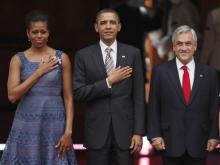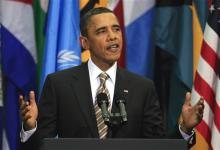
President Obama, first lady Michelle Obama and Chile's President Sebastian Pinera during a welcome ceremony at the La Moneda government palace in Santiago on Monday, March 21, 2011. (AP Photo/Roberto Candia)
(CNSNews.com) – President Obama on Monday defended his decision to launch a U.S. military campaign against Libyan leader Muammar Gaddafi while traveling outside the country.
During a joint news conference with Chilean President Sebastian Pinera in Santiago, Obama fielded several questions on Libya, including one regarding whether he should have taken a Latin American trip as the U.S. was about to enter a third international military conflict.
A United Nations Security Council resolution adopted last Thursday authorized the international community to take “all necessary measures” short of foreign occupation to protect civilians under threat of attack by the Libyan regime.
Obama and his family left Washington a day later, after Obama had met with members of Congress and delivered a statement to the nation about Libya.
“With respect to initiating this action while I was abroad,” Obama said in response to a reporter’s question in Santiago, “Keep in mind that we were working on very short timeframes, and we had done all the work, and it was just a matter of seeing how Gaddafi would react to the warning that I issued on Friday.”
“He, despite words to the contrary, was continuing to act aggressively towards his civilians. After a consultation with our allies, we decided to move forward,” Obama continued. “And, it was a matter of me directing Secretary of Defense [Robert] Gates and [Joint Chiefs of Staff Chairman] Admiral [Mike] Mullen that the plan – that had been developed in great detail, extensively, prior to my departure – was put into place.”

President Obama delivers a speech at Centro Cultural La Moneda Palace in Santiago on Monday. (AP Photo/Roberto Candia)
The stated U.S. policy is for regime change in Libya. The U.S. mission does not involve removing Gaddafi from power, however, but rather is limited to enforcing the U.N. resolution to prevent him from harming more Libyan civilians.
“I have also stated that it is U.S. policy that Gaddafi needs to go, and we’ve got a wide range of tools in addition to our military efforts to support that policy,” Obama said.
He noted that the administration had frozen Gaddafi’s assets in the U.S. that could have been used to fund mercenaries. The U.S. had also helped build the international consensus, the president said.
“But, when it comes to our military action, we are doing so in support of U.N. Security [Council] resolution 1973, that specifically talks about humanitarian efforts, and we are going to make sure that we stick to that mandate,” Obama said.
While campaigning for the presidency, Obama argued in Dec. 2007 that the president does not have the authority to act without congressional authority against a country that is not an immediate danger to the United States.
“The President does not have power under the Constitution to unilaterally authorize a military attack in a situation that does not involve stopping an actual or imminent threat to the nation,” the then U.S. senator for Illinois told the Boston Globe.
“As Commander-in-Chief, the President does have a duty to protect and defend the United States. In instances of self-defense, the President would be within his constitutional authority to act before advising Congress or seeking its consent. History has shown us time and again, however, that military action is most successful when it is authorized and supported by the Legislative branch.”
The question Obama was responding to was: “In what circumstances, if any, would the president have constitutional authority to bomb Iran without seeking a use-of-force authorization from Congress? (Specifically, what about the strategic bombing of suspected nuclear sites – a situation that does not involve stopping an IMMINENT threat?)”
Obama’s complete answer to the question was as follows:
“The President does not have power under the Constitution to unilaterally authorize a military attack in a situation that does not involve stopping an actual or imminent threat to the nation.
“As Commander-in-Chief, the President does have a duty to protect and defend the United States. In instances of self-defense, the President would be within his constitutional authority to act before advising Congress or seeking its consent. History has shown us time and again, however, that military action is most successful when it is authorized and supported by the Legislative branch. It is always preferable to have the informed consent of Congress prior to any military action.
“As for the specific question about bombing suspected nuclear sites, I recently introduced S.J. Res. 23, which states in part that “any offensive military action taken by the United States against Iran must be explicitly authorized by Congress.” The recent NIE tells us that Iran in 2003 halted its effort to design a nuclear weapon. While this does not mean that Iran is no longer a threat to the United States or its allies, it does give us time to conduct aggressive and principled personal diplomacy aimed at preventing Iran from developing nuclear weapons.”
Source material can be found at this site.









